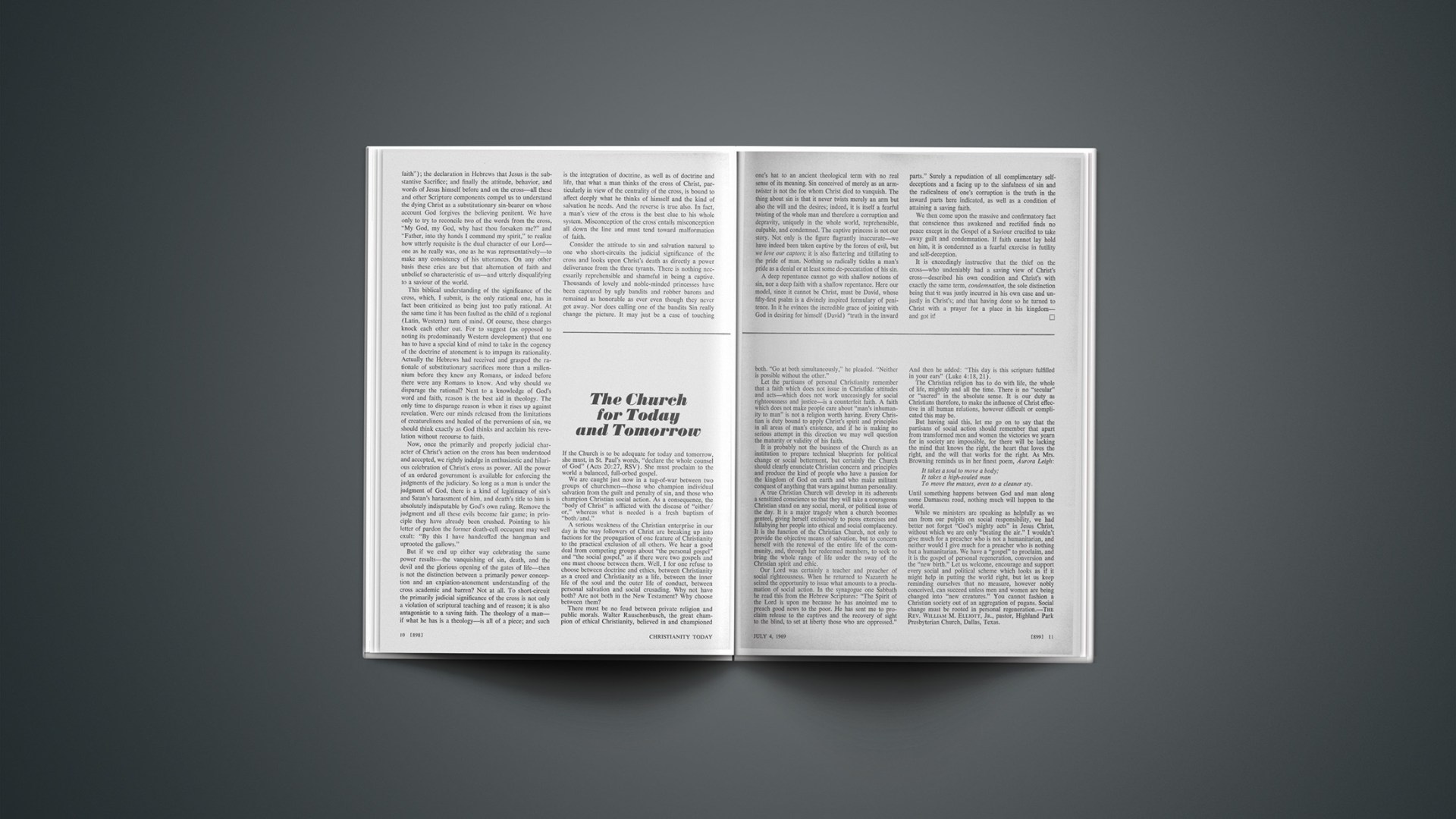If the Church is to be adequate for today and tomorrow, she must, in St. Paul’s words, “declare the whole counsel of God” (Acts 20:27, RSV). She must proclaim to the world a balanced, full-orbed gospel.
We are caught just now in a tug-of-war between two groups of churchmen—those who champion individual salvation from the guilt and penalty of sin, and those who champion Christian social action. As a consequence, the “body of Christ” is afflicted with the disease of “either/or,” whereas what is needed is a fresh baptism of “both/and.”
A serious weakness of the Christian enterprise in our day is the way followers of Christ are breaking up into factions for the propagation of one feature of Christianity to the practical exclusion of all others. We hear a good deal from competing groups about “the personal gospel” and “the social gospel,” as if there were two gospels and one must choose between them. Well, I for one refuse to choose between doctrine and ethics, between Christianity as a creed and Christianity as a life, between the inner life of the soul and the outer life of conduct, between personal salvation and social crusading. Why not have both? Are not both in the New Testament? Why choose between them?
There must be no feud between private religion and public morals. Walter Rauschenbusch, the great champion of ethical Christianity, believed in and championed both. “Go at both simultaneously,” he pleaded. “Neither is possible without the other.”
Let the partisans of personal Christianity remember that a faith which does not issue in Christlike attitudes and acts—which does not work unceasingly for social righteousness and justice—is a counterfeit faith. A faith which does not make people care about “man’s inhumanity to man” is not a religion worth having. Every Christian is duty bound to apply Christ’s spirit and principles in all areas of man’s existence, and if he is making no serious attempt in this direction we may well question the maturity or validity of his faith.
It is probably not the business of the Church as an institution to prepare technical blueprints for political change or social betterment, but certainly the Church should clearly enunciate Christian concern and principles and produce the kind of people who have a passion for the kingdom of God on earth and who make militant conquest of anything that wars against human personality.
A true Christian Church will develop in its adherents a sensitized conscience so that they will take a courageous Christian stand on any social, moral, or political issue of the day. It is a major tragedy when a church becomes genteel, giving herself exclusively to pious exercises and lullabying her people into ethical and social complacency. It is the function of the Christian Church, not only to provide the objective means of salvation, but to concern herself with the renewal of the entire life of the community, and, through her redeemed members, to seek to bring the whole range of life under the sway of the Christian spirit and ethic.
Our Lord was certainly a teacher and preacher of social righteousness. When he returned to Nazareth he seized the opportunity to issue what amounts to a proclamation of social action. In the synagogue one Sabbath he read this from the Hebrew Scriptures: “The Spirit of the Lord is upon me because he has anointed me to preach good news to the poor. He has sent me to proclaim release to the captives and the recovery of sight to the blind, to set at liberty those who are oppressed.” And then he added: “This day is this scripture fulfilled in your ears” (Luke 4:18, 21).
The Christian religion has to do with life, the whole of life, mightily and all the time. There is no “secular” or “sacred” in the absolute sense. It is our duty as Christians therefore, to make the influence of Christ effective in all human relations, however difficult or complicated this may be.
But having said this, let me go on to say that the partisans of social action should remember that apart from transformed men and women the victories we yearn for in society are impossible, for there will be lacking the mind that knows the right, the heart that loves the right, and the will that works for the right. As Mrs. Browning reminds us in her finest poem, Aurora Leigh:
It takes a soul to move a body;
It takes a high-souled man
To move the masses, even to a cleaner sty.
Until something happens between God and man along some Damascus road, nothing much will happen to the world.
While we ministers are speaking as helpfully as we can from our pulpits on social responsibility, we had better not forget “God’s mighty acts” in Jesus Christ, without which we are only “beating the air.” I wouldn’t give much for a preacher who is not a humanitarian, and neither would I give much for a preacher who is nothing but a humanitarian. We have a “gospel” to proclaim, and it is the gospel of personal regeneration, conversion and the “new birth.” Let us welcome, encourage and support every social and political scheme which looks as if it might help in putting the world right, but let us keep reminding ourselves that no measure, however nobly conceived, can succeed unless men and women are being changed into “new creatures.” You cannot fashion a Christian society out of an aggregation of pagans. Social change must be rooted in personal regeneration.—THE REV. WILLIAM M. ELLIOTT, JR., pastor, Highland Park Presbyterian Church, Dallas, Texas.










